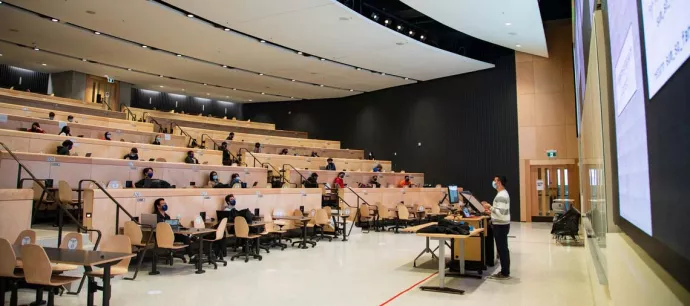
For a summary of departmental statements, equity-based syllabi and recruitment, along with committees, please see below:
Departmental Statements
Statement against Anti-Asian Racism and Misogynistic Violence
The Department of Anthropology expresses its grief for and anger over the loss of the eight people murdered Tuesday, March 16, 2021 in Atlanta. Their names are Delaina Ashley Yaun, Paul Andre Michels, Xiaojie Tan, Daoyou Feng, Soon C. (Julie) Park, Suncha Kim, Yong Yue, and Hyeon Jeong Park Grant. Six of those killed were Asian-American and seven were women. These killings must be named for what they are: expressions of hate, anti-Asian discrimination, misogyny, and white supremacy. Read more »
Statement on Anti-Black Racism
The Graduate Department of Anthropology at the University of Toronto stands in solidarity with Black communities against recent and ongoing police brutality. We acknowledge the distress that members of our community may be experiencing in response to recent examples of anti-Black police violence and the subsequent protests and counter-protests across North America. Read more »
Statement on Unmarked Burials at Former Residential Schools
The University of Toronto Department of Anthropology wishes to express condolences with Tk’emlúps te Secwépemc and with all First Nations, Métis, and Inuit communities whose missing children died in residential schools across Canada. We acknowledge the trauma that communities continue to endure as more unmarked graves are located. Read more »
Committees
The Department of Anthropology at UTM is currently setting up an Equity Diversity and Inclusion (EDI) committee. There is already a Diversity and Decolonization committee at the graduate level. More information will be shared at a later date.
Equity-Based Syllabi: Statements
- From ANT241H: Anthropology and Indigenous Peoples of Turtle Island in Canada: view sample statement »
- From ANT381H: Queer Bodies: Gender, Disability and Illness: view sample statement »
- Also view this crowdsourced list of syllabus statements on disability and accessibility, assembled by Professor Zoe Wool in UTM's Department of Anthropology
Equity-Based Recruitment: Diversity Statements
From the Indigenous anthropological archaeology search (2020):
"Applicants must have earned a PhD in Anthropological Archaeology by the date of appointment, or shortly thereafter, with a demonstrated record of excellence in research and teaching. We seek scholars with an innovative research program in the archaeology of North America with an ongoing field program whose research and professional work engages with collaborative/collective knowledge building with Indigenous communities and whose teaching integrates Indigenous knowledge/Indigenous ways of knowing, epistemologies, and methodologies.
This position is part of the University of Toronto’s response to the calls to action in Canada’s Truth and Reconciliation Commission (TRC) Report. Preference will be given to candidates who self-identify as Indigenous. Recognizing that there are a variety of terms that potential candidates may use to self-identify, the University uses the term “Indigenous” in this search to encompass the people of Turtle Island, including those who identify as First Nations, Métis, Inuk (Inuit), Alaska Native, Native American, and Native Hawaiian people.
In addition to their reference letters, candidates should include in their application packages one or more letters of support from Indigenous elders, leaders, or organisations describing their collaborative work or involvement with Indigenous communities.
Because equity and diversity are among UTM’s core values and are essential to academic excellence, we seek candidates who value diversity and whose research, teaching, and service bear out our commitment to equity. Candidates are therefore asked to submit a 1–2-page statement about their contributions to equity and diversity, covering such topics as: research or focus on underrepresented communities; the development of inclusive pedagogies; the mentoring of students from underrepresented groups; and other relevant activities."
From the Ontario archaeology search (2021)
“Candidates must have a significant track-record of research and professional work that engages in strong partnerships of collaborative/collective knowledge building with Indigenous communities from this region and must integrate Indigenous knowledge/Indigenous ways of knowing and Indigenous methodologies in their research and teaching.
Applicants must have a track record of leadership in support of Indigenous work in archaeology.
Research and teaching evidence of excellence demonstrating significant partnerships with Indigenous communities, such as community-based participatory research (CBPR) involving Indigenous groups or Indigenous community-oriented training to share archaeological methodology, is required.
At UTM we are committed to fostering an environment of diversity and inclusion. With an enviable diverse student body, we especially welcome applications from candidates who identify as Indigenous, Black, or racially visible (persons of colour), and have experience working with teaching or mentoring diverse groups or students. Candidates must demonstrate an ability to foster diversity on campus and within the curriculum or discipline, and must show evidence of a commitment to equity, diversity, inclusion, and the promotion of a respectful and collegial environment - demonstrated through their application materials. Candidates, therefore, must submit a statement of contributions to equity, diversity, and inclusion (EDI), which might cover topics such as (but not limited to): teaching that incorporate a focus on underrepresented communities, the development of inclusive pedagogies, collaboration and engagement with, and service to, underrepresented communities, or the mentoring of students from underrepresented groups.
In addition to the three reference letters, candidates should arrange for one or more letters of support from Indigenous elders, leaders, or organisations describing their collaborative work or involvement with Indigenous communities to be sent to Professor Esteban Parra, Chair of the Department of Anthropology."
Last updated August 2022
